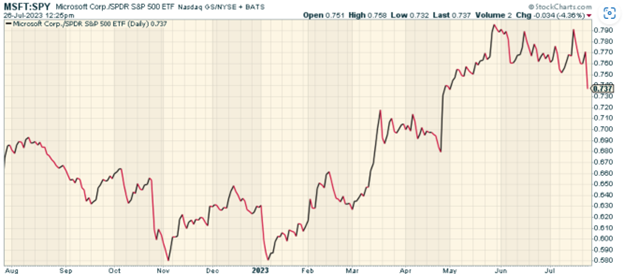Did Microsoft (MSFT) Stock Just Peak?
Microsoft (NASDAQ:MSFT), a tech giant globally known for its robust portfolio of services and products, has had a remarkable surge in its performance. We’ve all heard about the “Magnificent 7,” and it’s clear that MSFT stock owners have meaningfully outperformed relative to the S&P 500.

Microsoft’s financial health has been consistently robust, with the company posting some of its highest-ever financial metrics in recent quarters. In the three-month period ending June 30, the company posted $56.2 billion in sales and $2.69 earnings per share, smashing consensus estimates. Microsoft shattered several of its financial records during the most recent quarter, with its gross sales and net income ($20.1 billion) hitting an all-time high. However, much of this may be priced in, which explains the aggressive weakness we’ve seen following.
One of the major growth drivers (and narratives) for the company has been its strategic investment in artificial intelligence. The company’s intelligent cloud segment, which houses many of Microsoft’s current AI offerings, helped drive a 21% year-over-year increase in operating income. Microsoft’s investment in AI has not only bolstered its financial performance, but also attracted investors. Its market capitalization skyrocketed by about $800 billion this year as investors generally bought into the notion that Microsoft will successfully convert the AI hype into profits.
Microsoft CEO Satya Nadella has successfully pivoted Microsoft toward high-value commercial and cloud application businesses. This strategic move comes as enterprises accelerate their digital transformation.
Cloud, AI Results Put Microsoft on Watch
Microsoft’s cloud services, now contributing to more than half of the total revenue, continue to gain scale efficiencies, suggesting a positive outlook for the company’s financial health. However, Microsoft’s Azure cloud services unit showed that revenue growth was below Wall Street estimates. Azure’s revenue grew 26% in the fourth quarter, a percent point below the growth in the previous quarter.
This trend could indicate a potential slowdown in Microsoft’s cloud services growth, which contributes significantly to the company’s overall revenue.
The real driver of stock price movement as we know has been the AI narrative. Microsoft plans to charge businesses $30 per user for its AI copilot, which will analyze data in Excel and summarize meetings in Teams. This move indicates Microsoft’s intent to tap into the revenue potential of AI. Game changer?
Potentially yes, but it remains to be seen how monetizable this ultimately will be.
The bigger issue remains that the stock is vulnerable to mass selling of index funds. If we look at the popular Invesco QQQ Trust ETF (NASDAQ:QQQ), Microsoft has a 9.84% weighting. Any kind of correction or panic selling in that fund as well as the S&P 500 broadly could cause a nasty self-fulfilling decline in Microsoft’s stock.
The Bottom Line on MSFT Stock
I think Microsoft’s stock is tired and vulnerable here if we are on the edge of a broader risk-off event. Fundamentals still look very appealing, and the growth story is real, but it’s the co-movement and weighting which makes it challenging to get comfortable allocating in here.
Did we see a short-term peak in MSFT stock? It seems very possible but keep a close eye on it toward the end of the year.
On the date of publication, Michael Gayed did not hold (either directly or indirectly) any positions in the securities mentioned in this article. The opinions expressed in this article are those of the writer, subject to the InvestorPlace.com Publishing Guidelines.

